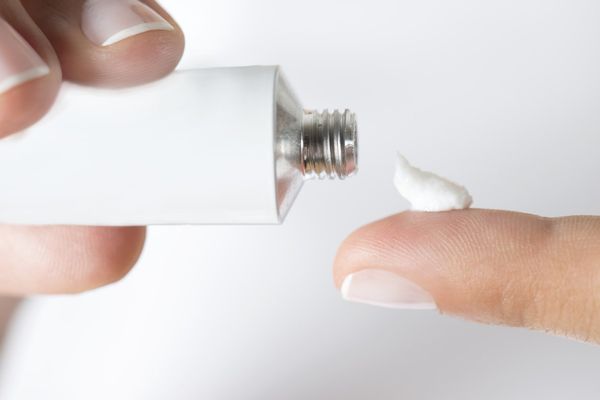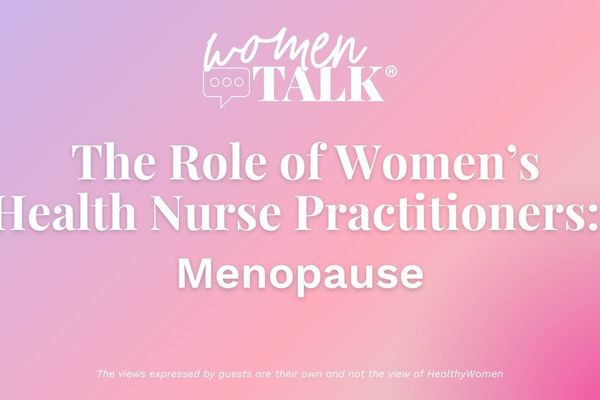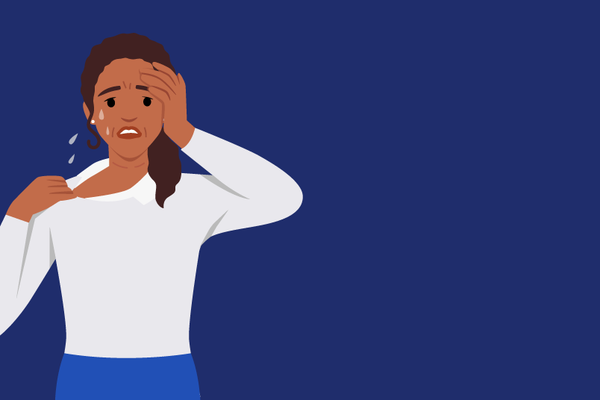Menopause and weight gain: a common complaint.
I hear it all the time. When women begin to go through menopause, while they're going through it, and once they're over it, they blame it for their weight gain. "I can't lose weight … get up the energy to exercise … fight my food cravings."
And then, they give up.
But if you're reading this and you fall into that category of thinking, "There's nothing you can do about it anyway," please keep reading.
While it's undeniable that menopause ushers in a lot of changes—you're not imagining the thinning hair, erratic moods, food cravings, sleep problems and dryness (everywhere)—it doesn't mean that you need to give up on your goals of being healthy and fit.
Check out The Beginner's Guide to Menopause.
But let's get back to weight.
I recently interviewed two leading experts on the subject. Scott Kahan, MD, is director of the National Center for Weight and Wellness and serves as chair of the Clinical Committee for the Obesity Society. Health and fitness expert Jeff Halevy is a thought leader and fitness industry innovator and former Today Show correspondent who told me he adores his mom so much and wants her to read this information, too.
Note: I wish I had been sitting in the same room with these two brilliant minds. But I wasn't: This "conversation" took place via email and phone. But, for ease of getting the points across, I'm taking artistic license and writing it up as if it were a conversation we all had together. (Maybe we would have been sipping sparkling water and eating healthy snacks while chatting.)
Me: What's the association between weight gain and menopause?
Dr. Kahan: There are a number of reasons. Your body goes through biological changes, including hormonal changes, that affect your appetite. There are changes in how fat cells synthesize and store fat. Also, hot flashes can interfere with your sleep—and there is an association between poor sleep and the risk for weight gain.
Me: So many women complain that their weight is out of control. How much weight do most women gain during this time?
Dr. Kahan: Scientific data show that it's not as much as most people think: on average, it's only about five pounds, actually.
Me: Aside from complaining that their weight is out of control, many women feel they can't do much to control it. Sadly, I've seen so many women give up and give into their "oh-well-there's-nothing-to-be-done" unhappy "fate."
Halevy: Here's what I think: Rather than simply accepting or blaming what you might think of as an unfortunate set of circumstances, know that you do have the power to change … we have an option! When you adopt the role of victim, it becomes an excuse not to get better, and you're only harming yourself. (Actually, I'm borrowing that from my mother's book; that's what she always told me, and I believe it and live it now.)
Dr. Kahan: I couldn't agree more. Weight gain during menopause is not a fait accompli. The worst thing you can do is throw up your hands and assume there's no point in even trying. There's a lot you can do to prevent weight gain and/or turn things around.
Me: That's always been my attitude. We might not be able to fight aging, but rather, we can embrace it and figure out the best ways to do it.
OK, let's assume most women do know that in order to manage or lose weight, they need to change their diet and get more exercise. But they get frustrated, because they're not seeing results. What advice would you give them?
Dr. Kahan: It's true you may need to adjust how you eat and exercise to combat the hormonal changes of menopause.
Halevy: I'll chime in on the exercise portion of that statement. Here's something a lot of women will like to know: You don't have to work as hard as you think! People think you have to knock yourself out.
Me: Well, that's kind of true, isn't it? I mean, our metabolism does slow down as we age, so don't we have to rev it up?
Halevy: Yes, you do, but research says all you actually need is 20 minutes a day—that's it. A moderately paced walk (if you don't know what that means, pretend you're in a hurry to catch a flight) is sufficient. If you have a heart-rate monitor, for most people that means a heart rate of about 105 to 115 beats per minute. Of course, if you want to do more, it can't hurt. And if you miss an occasional day, don't beat yourself up; there's always tomorrow.
Dr. Kahan: As for your diet, things do change during menopause. For example, insulin resistance becomes more common during and after menopause. With this in mind, it may be helpful to aim to lower your intake of carbohydrates or aim for foods that are lower on the glycemic index scale.
Also, menopause not only slows your metabolism, but it also lowers your lean mass—your muscle and bone strength.
Halevy: That's right. Because we lose bone and muscle as we age, it's important to incorporate resistance training into your routine. But that doesn't have to mean heavy weight lifting. There are six movements we all need to stay strong: pushing, pulling, twisting, bending, squatting and lunging. Think about how you can work those into your daily routine—you can get in shape with just your body.
Dr. Kahan: Agreed. Strength training and weight-bearing exercise is particularly valuable when you're trying to manage the changes of life during menopause.
Me: You can use hand-held weights or machines, but you can also easily accomplish those movements with your own body weight. For example, gardening requires many of those actions, or you can do things like push-ups, squats and lunges in the privacy of your home. Sometimes at night while I'm watching television, I'll sit on a big stability ball and grab a pair of light hand-held weights. It's multitasking in a good way: I'm strengthening my core, working on my balance and strengthening my muscles at the same time.
Halevy: I never met a farmer who wasn't incredibly strong and lean—that's just impossible. Think about it. They're pushing, pulling, lifting, bending, squatting—all these things your body needs to maintain muscle mass and strength.
Me: What else should women know about weight gain and menopause?
Dr. Kahan: We should always start by focusing on behavioral changes, like we just discussed. Generally, eating healthy and exercising remains a cornerstone of weight management. If needed, medications to address appetite changes may be helpful. There are several FDA-approved ones out there than can help for managing weight and preventing weight-related health problems that may occur if women gain weight during menopause or later in life.
Also, strategies to address hot flashes, if they're getting in the way of sleep, can address these uncomfortable symptoms and minimize weight gain.
Halevy: Staying flexible is important too. I call it "joint hygiene." Find five minutes each day to do some stretching and mobility work. During the night, we're basically immobile—that's why we're stiff when we wake. Remember making those arm circles in gym class? Do them now, but bigger and more deliberately. Movements like this will engage the muscles in your back, help maintain your joint health.
Me: There are many considerations and limitations—genetics among them—that preclude having that perfect physique of a triathlete. But women should not give up on their goals of being healthy and fit.
Practice some self-care. Exercise is not just about losing weight: It boosts mood and immunity and preserves cardiovascular health and cognitive function. And if you've fallen off the bandwagon, it doesn't mean you can't get back on.
Thank you, gentlemen. Your guidance and knowledge are much appreciated!
Read More:
What No One Tells You About Menopause
- Menopause and Diabetes: What's the Connection? - HealthyWomen ›
- There's A Lot More to Menopause Than Hot Flashes - HealthyWomen ›
- Estrogen and Weight Gain: What's the Connection? - HealthyWomen ›
- Fight Menopausal Weight Gain: Your Diet ›
- The Truth About Menopause and Weight Gain - HealthyWomen ›
- The Secret to Combating Perimenopause Weight Gain ... ›
- Weight Gain: Dirty Menopausal Trick ›
- 10 Strategies for Weight-Loss Success - HealthyWomen ›
- Why Many People Gain Weight in the Fall (And How to Avoid It) - HealthyWomen ›







